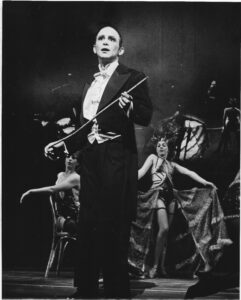Renegotiating the Past: The Representation of History in English- and German-language Musical Theatre Repertoire since WWII
News | Aktuelles

Project of the Department of Art, Music and Dance Studies, funded by the FWF
- Principal Investigator: Prof. Dr. Nils Grosch
- Primary Researcher: Dr. Olaf Jubin
- Co-Researcher: Miriam Ljubijankic
Collaborating Universities and Special Advisors:
- Anton-Bruckner-Privatuniversität Linz: Prof. Dr. Carolin Stahrenberg
- Goldsmiths, University of London: Prof. Robert Gordon
- Albert-Ludwigs-Universität Freiburg: Professor Dr. Dr. Michael Fischer
The study, comprising a main and a side project, examines how European cultural history and politics is refracted through the prism of the musical as one of the most popular performance genres.
It will be the first proper analysis of works that have referenced and represented the history of those two regions, after the USA, constitute the two largest markets for musical theatre worldwide: the United Kingdom and the German-speaking countries.
Main Project
Our historical consciousness is given vivid shape by popular entertainment, making it imperative that works with mass appeal – such as stage musicals and their film adaptations – are examined.
The project produces case studies of musicals in English and German, which have contributed to the various understandings of European history in the UK, Germany and Austria, not least regarding each country’s involvement in two world wars.
This leads to the central concern of the study which will use repertoire analysis, performance analysis, media analysis, reception history to source documentation in answering the question:
How do post-1945 musicals negotiate and represent European history?
That overall topic splits into a number of complementary research areas. These include, but are not limited to:
- Which post-war English- and German-language musicals have become canonical in the UK, Austria and Germany in their representation of European history and why?
- How differently have the same musicals been received in these three countries?
- What can a comparative analysis of reception tell us about divergent ways of comprehending European history?
- In what ways do musicals construct national and personal identity?
- Which aspects of musical theatre’s treatment of history remain consistent, and which have been challenged or revised?
- Does the understanding of European history change when privileging cross-cultural collaboration rather than exploring popular culture from a fixed national point of view?
- What were the contributions of women and ethnic minorities to post-war musical theatre in the UK, Austria and Germany?
- In what ways is the portrayal of the past in musicals coloured by nostalgia and the demands of the heritage industry?
- How do post-war musicals employ popular culture as a means of depicting the European past?
- How is the reception and thus the meaning of historical events and figures affected by transformations from one medium to another?
- How do post-war musicals in English and German challenge simplistic notions of the past and encourage the addressing of uncomfortable questions?
Side Project
The PhD thesis will approach the topic of how post-war stage and film musicals represent European history from a different but complementary angle: treating both musical elements and the human body as texts to be read, it will view the historical research material through a prism of body socialisation and body studies. The aim is to offer a feminist, post-feminist and queer reading of perceptions of the European past by exploring the following and other gender-relevant questions:
- How are gendered attributions utilised, especially in the perception of a collective socio-cultural memory in Western cultures, in post-war musicals about European history?
- Which attributions do these shows use in the staging of characters? Do they ever fall outside binary understandings of cis-gender constructs in their depiction of the past?
- What are the implications and associations of these (re)presentations?




